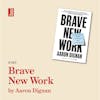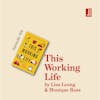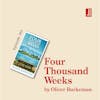Anything You Want by Derek Sivers: the surprising way to grow a company by not focusing on growth
About the book
In this book, Derek tells you everything he learned from starting, growing, and selling CD Baby, compressed into an entertaining and useful one-hour read.
No secrets held back, Derek shares the biggest mistakes, keys to its success, and the philosophies behind the big decisions.
Called “40 lessons for a new kind of entrepreneur”, it’s 10 years of experience in one hour, designed to be immediately usable for your own business or project.
(You can buy the book and support the podcast at the same time by buying through Book Depository (Aus+Global) by clicking HERE or Bookshop (US) HERE.)
About the author
Derek has been a musician, producer, circus performer, entrepreneur, TED speaker, and book publisher.
He’s a monomaniac, introvert, slow thinker, and loves finding a different point of view.
A California native, he now lives in New Zealand.
Some useful links
More about Derek here.
Read Derek’s book summaries here.
Listen to him on the Tim Ferriss podcast
BIG IDEA 1 - START SMALL
This is one of the biggest lessons that flows throughout the book. Derek talks about how there is no funding required, no MBA required, no fancy office required just to start your business. The most important thing is that you start. Because he says that most people “wait for the finish line to appear whilst they’re still at the starting line” and never take action.
Starting small also means you can 100 percent focus on solving a problem for a customer, which is ultimately the most important thing we should all be doing in our businesses. It also gives a stronger foundation to build from. As if you start small, if you know you can operate at that small level, you are able to leverage and build on this strong base later on.
So before you build an empire, teach one person something, cook something for one person, make something for one person, put something out online. Whatever it is you do, start with one person, one customer who has the problem that you solve.
There's also strength in having many little customers. Many businesses dream of landing that ‘one big customer’. But he says that having many little customers or clients means the acquisition process is easier and losing a client isn't a catastrophe. You also don't have to make as many compromises, which often those bigger clients or big companies will force you to do, which then is often at the detriment of your other clients or other customers.
Starting small means you're also able to maintain creative control. For example, to send quirky order confirmation emails which CDBaby were famous for. You can stay casual. You can embrace that ‘Hell yeah or no’ mentality. You can focus on the little things that make a big difference.
One of the quotes I loved in the book was “when you start a business, you get to start a universe where you set all the laws. This is your utopia”. But you can only do that successfully if you start small, if you're only answering to your clients, your customers and to yourself.
BIG IDEA 2 - IT’S ALL ABOUT YOUR CUSTOMER
This is where you start to push against conventional wisdom.
Derek talks about growth quite a lot in the book and asks the question ‘would your customers really want you to grow?’
Now, of course, they want to you to get to the point where the business is sustainable, where the systems work and everything's slick, but they possibly don't want you to grow too much. That can mean that they become much less important. Maybe as you get bigger, the service would actually decline rather than rather than improve because it gets slower as you deal with more customers. It might also mean that prices go up, too.
Derek talks about the decisions that he made for CDBaby always came back to ‘what would the customers want?’ He didn't take the significant amounts of money he was offered by other companies or venture capitalists or investors to invest in the business. And they would always ask, “but don't you want to grow”? And he would say, no.
They also pushed conventional wisdom by charging flat rates, not accepting pay to promote offers (so if you were a band with a bit more money, you couldn't pay extra to get your album on the front page of CDBaby) because he thought that was unfair. He offered no fuss returns, even when people would ask for returns or refunds for reasons that maybe weren't particularly reasonable. And in a move that feels quite alien now, he wouldn't let any ads on the website because he intimately knew his customer and that they wouldn’t want it.
Because let's face it, when we go to a website, do we ever say ‘oh, brilliant, this website has got loads of ads and I can't click on anything without having to actually try and turn off an ad that keeps moving and I can’t find the X button’. No. Nobody wants that.
The litmus test for all decisions Derek made was ‘will this benefit the customers’? So when he was fitting out their early office, and his friends were spending $10,000 on new desks, and he spent $1,000, and it was perfectly adequate, he was really asking, who is that fit out really for? Does it benefit your customers if you have the fanciest furniture? This also means rejecting some of the formalities that other people try and scare you into doing for your business, especially if they add no value.
And remember, it's the little things that do make a difference to your customers. Answering the phone in two rings. Coding into their website the time left until 5pm, when they sent the FedEx shipments out of the of the daily orders, so people could see how long they had to put their order in. And little silly things like putting a stick of cinnamon gum in with an order, because a customer had requested it.
The quote from the book that sums this up is “even if you want to be big someday, remember that you never need to act like a big, boring company. Over 10 years, it seemed like every time someone raved about how much he loved CDBaby, it was because of one of these fun little human touches”.
It's all of these things that you can use to grade yourself. It may not be that you need to always be looking at how much money you're making to actually sense whether you're doing a good job or whether you're doing enough. The little things like putting your customer first, hearing their feedback, seeing what people's experiences are, can be a much better measure of success and how you grade yourself.
[[Oh hi, are you enjoying the podcast? If so, you can say thanks and buy me a coffee here]]
BIG IDEA 3 - YOU DON’T NEED A PLAN
Again, another bit of a conventional wisdom kick here. He argues that it's perfectly OK to roll with it, to keep a focus on helping people and customers today because things change. Derek once wrote to one of his team in the early days of CDBaby, when things were growing and they were doing well. He said, you know what, if we have a thousand artists signed up with us one day and we might need three employees or four employees.
Now over time, that email became quite laughable because they grew so far beyond that. They had 85 employees at the point that Derek sold the company. So this is the point, that things change and the things that you think are your plan or your vision may become less relevant over time. You may exceed that. Or you might change course.
There's also so many options, all good and all different, and we should stay open to them. There is not one way or one single path.
So not having a plan allows you to change and respond when you hear feedback from your customers. Derek says that it's most important to focus on today. To ask who needs you today, rather than getting sucked into what's next or what's five years or ten years down the line.
Support my book habit: https://www.buymeacoffee.com/stephsbookshelf
See omnystudio.com/listener for privacy information.
Hey, have you subscribed to the bookmark newsletter? If you liked this, you might like my twice-monthly email with book reviews and ideas of what you should be reading, and listening to, next. Click here to subscribe.
Popular episodes
Here are some great episodes to start with.

















